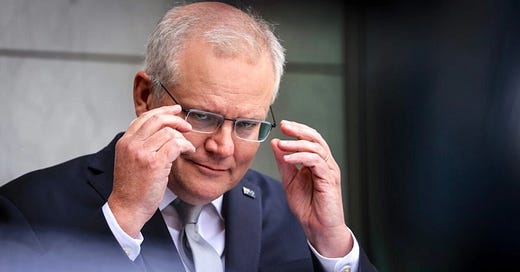The Australian Parliament came alive with renewed activity last week, with many critical issues vying for attention. While housing, education, and Reconciliation initiatives are crucial, it’s the spectre from the past that refuses to fade into obscurity: the sinister Robodebt scheme and the damning Royal Commission report.
The Housing Australia Future Fund and the progress towards Reconciliation through an amplified Voice to Parliament are undoubtedly pressing matters. However, they seem overshadowed by the shadows of Coalition government program that wreaked havoc on countless lives. The Robodebt debacle, a scheme designed to supposedly claw back social security overpayments, has resurfaced with a vengeance as the aftermath of the Royal Commission report unfolds.
In a striking display of audacity, the former Prime Minister, Scott Morrison, brazenly dismissed the Commission’s damning findings against him. The report meticulously detailed the unintended suffering inflicted on individuals and their families yet, Morrison staunchly asserts that he bears no responsibility, denouncing the Commission’s conclusions as “disproportionate, incorrect, and unsubstantiated”.
There are chilling echoes of Morrison’s rhetoric in the divisive tactics employed by former US President Donald Trump, a style of politics that we thought we might have left behind. Morrison’s claims that he is a victim of political targeting also ignited a war of words with Minister for Government Services, Bill Shorten, who vehemently countered that the real victims are those whose lives were lost and trust eroded due to the unlawful scheme, not Morrison, who he labelled “a bottomless well of self-pity with not a drop of mercy for all of the real victims of Robodebt”.
Shorten’s impassioned response, laced with anger and frustration, drove home the enormity of the pain inflicted by the Robodebt scheme, emphasising that those who suffered were not politicians such as Morrison protected by parliamentary privilege, but everyday Australians stripped of their dignity and livelihoods. The Royal Commission, hailed as one of the most comprehensive and exhaustive in modern times, wielded its authority to reveal the truth behind the former government’s actions.
However, Morrison’s attempts to belittle the Commission’s legitimacy have sparked a fierce criticisms from other quarters. His attempts to disentangle himself from the scheme’s web of consequences, insisting that he is not accountable for its repercussions, made him look foolish. Morrison’s evasion of responsibility is emblematic of the broader political trend that existing during the Liberal–National Coalitions time in office between 2013–22, echoing the public’s frustration with politicians who evade accountability at every turn.
In the court of public opinion, Morrison’s defence stands – labelled by Shorten as the “Morrisonian Doctrine” of lies and mistruths – on shaky ground. Comparing the Royal Commission’s rigour to that of landmark inquiries such as the banking Royal Commission, or the investigation into child sexual abuse in religious institutions, the implications of this report may lead to fundamental reforms in Australia’s political landscape. Yet, the former Prime Minister’s refusal to accept his role in the debacle remains a symbol of his obstinacy.
Ignorance of the Robodebt facts
How can Morrison be so ignorant of the facts? The Robodebt scheme followed a painstakingly and forensically detailed examination by the Commission, encompassing thorough investigations and testimonies, bringing to light the extent of the suffering endured by countless individuals and their families due to the flawed scheme.
The voices of witnesses, often lost in the political manoeuvring from the Coalition at the time, and a mainstream media which showed a noticeable reluctance to engage deeply with the issue, found a platform through independent media outlets, which initially were instigated through the work of information activist, Asher Wolf.
The proceedings, though, were not lost on the public. The transparency and accountability displayed by the Royal Commission stood in stark contrast to Morrison’s response, which were purely attempts to sidestep his own culpability and the former Prime Minister’s insistent denial of the Commission’s findings raises serious questions about the nature of accountability in the political landscape.
As Morrison endeavours to distance himself from the Robodebt debacle, suspicions have grown regarding his motivations, possibly a pre-emptive measure in preparation for potential appearances at the National Anti-Corruption Commission, where his actions could face further scrutiny.
Other former Ministers, such as Alan Tudge and Christian Porter, who were also under scrutiny due to their involvement in the Robodebt scheme, could also face investigation by the National Anti Corruption Commission, despite their assertions that they were not named within the special “sealed section” of the Royal Commission report. However, despite these assertions from former Ministers, the aftermath of the Robodebt report underscores the complexity of the situation and the need for thorough investigations to reveal the complete truth.
In the midst of this political storm, the public demands answers. Morrison’s dismissive demeanour during Shorten’s accusations, coupled with his apparent lack of remorse, has left many astounded, with Morrison laughing in parliament while Shorten’s comments were being made – surely not the best response to make when considered the lives forever altered by the effects of the Robodebt scheme.
One question still lingers: can a nation truly move forward when its leaders refuse to face the past? The urgency for accountability will intensify as survivors and affected families demand justice through potential class action lawsuits. The previous government’s efforts to whitewash the debacle could also be challenged by a legal reckoning that transcends the confines of political privilege.
The question of Morrison’s political future also looms large, with his already-damaged reputation tarnished further by his insolent response to the Commission’s report. His reluctance to accept accountability is at odds with a public that demands transparency and responsibility from their leaders. As the nation grapples with the aftermath of this ordeal, one thing is certain: the debate over political accountability has only just begun, and the waves of reform it ushers in are likely to reverberate for years to come.





